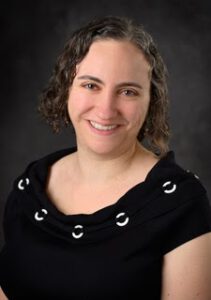Episode 23: Music Education for Social Change - interview with Dr. Juliet Hess
Dr. Juliet Hess offers both theory and practical suggestions about how music classrooms are uniquely poised to inspire and support social change at the intersections of activism, critical pedagogy, and music education. Highlighting the framework and specific examples from her book Music Education for Social Change: Constructing an Activist Music Education, Dr. Hess shares her research, stories, and ideas for what teaching for social change could look like and sound within music education classroom.

Dr. Juliet Hess
Associate Professor of Music of Music Education at Michigan State University
jlhess@msu.edu
Juliet Hess is an associate professor of music education at Michigan State University, having previously taught elementary and middle school music in Toronto. Her book, Music Education for Social Change: Constructing an Activist Music Education, explores the intersection of activism, critical pedagogy, and music education. Her second book, Trauma and Resilience in Music Education: Haunted Melodies, is an edited volume co-edited with Deborah Bradley. Juliet received her Ph. D. in Sociology of Education from the Ontario Institute for Studies in Education at the University of Toronto. Her research interests include anti-oppression education, trauma-informed pedagogy, activism in music and music education, music education for social justice, disability and Mad studies, and the question of ethics in world music study.
Resources:
Website:
Curriculum:
Constructing an Activist Music Education: A 6-12 Curriculum
Books:
Hess, J. (2019). Music education for social change: Constructing an activist music education. Routledge.
Bradley, D., & Hess, J. (Eds.). (2022). Trauma and resilience in music education: Haunted melodies. Routledge.
Articles:
Hess, J. (2015). Upping the “anti-“: The value of an anti-racist theoretical framework in music education. Action, Criticism & Theory for Music Education, 14(1), 66-92.
Hess, J. (2017). Equity and music education: Euphemisms, terminal naivety, and Whiteness. Action, Criticism & Theory for Music Education, 16(3), 15-47. http://act.maydaygroup.org/act-16-3-15-47/
Hess, J. (2018). Challenging the empire in empir(e)ical research: The question of speaking in music education. Music Education Research, 20(5), 573-590. https://doi.org/10.1080/14613808.2018.1433152
Hess, J. (2019). Singing our own song: Navigating identity politics through activism in music. Research Studies in Music Education, 41(1), 61-80. https://doi.org/10.1177/1321103X18773094
Hess, J. (2020). Towards a (self-)compassionate music education: Affirmative politics, self-compassion, and anti-oppression. Philosophy of Music Education Review, 28(2), 47-68. https://doi.org/10.2979/philmusieducrevi.28.1.04
Hess, J. (2021a). Becoming an anti-racist educator: Resisting whiteness in music education. Music Educators Journal, 107(4), 14-20. https://doi.org/10.1177/00274321211004695
Hess, J. (2021b). Cultural competence or the mapping of racialized space: Cartographies of music education. Bulletin of the Council for Research in Music Education, 227, 7-28. https://doi.org/https://www.jstor.org/stable/10.5406/bulcouresmusedu.227.0007
Hess, J. (2021c). Music education and the colonial project: Stumbling toward anti-colonial music education. In R. Wright, G. Johansen, P. A. Kanellopoulos, & P. K. Schmidt (Eds.), The Routledge Handbook to Sociology of Music Education (pp. 23-39). Routledge.
Hess, J. (2021d). “Putting a face on it”: The trouble with storytelling for social justice in music education. Philosophy of Music Education Review, 29(1), 67-87. https://doi.org/10.2979/philmusieducrevi.29.1.05
Hess, J. (2021). Musicking a different possible future: The role of music in imagination. Music Education Research, 23(2), 270-285. https://doi.org/10.1080/14613808.2021.1893679
Hess, J. (2018). A “discomfortable” approach to “world music”: Reenvisioning contextualized “world music education”. Philosophy of Music Education Review, 26(1), 24-45. https://doi.org/10.2979/philmusieducrevi.26.1.03

